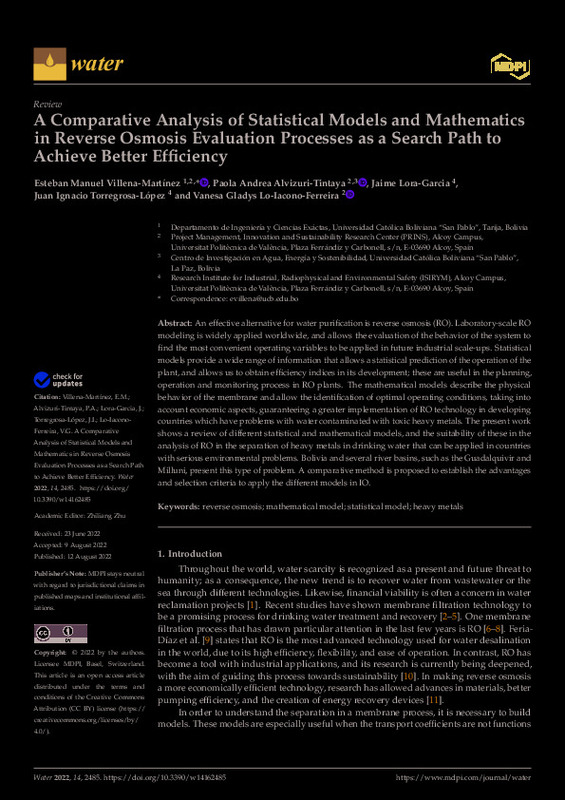JavaScript is disabled for your browser. Some features of this site may not work without it.
Buscar en RiuNet
Listar
Mi cuenta
Estadísticas
Ayuda RiuNet
Admin. UPV
A Comparative Analysis of Statistical Models and Mathematics in Reverse Osmosis Evaluation Processes as a Search Path to Achieve Better Efficiency
Mostrar el registro sencillo del ítem
Ficheros en el ítem
| dc.contributor.author | Villena-Martínez, Esteban Manuel
|
es_ES |
| dc.contributor.author | Alvizuri-Tintaya, Paola Andrea
|
es_ES |
| dc.contributor.author | Lora-García, Jaime
|
es_ES |
| dc.contributor.author | Torregrosa López, Juan Ignacio
|
es_ES |
| dc.contributor.author | Lo-Iacono-Ferreira, Vanesa G.
|
es_ES |
| dc.date.accessioned | 2023-05-12T18:02:17Z | |
| dc.date.available | 2023-05-12T18:02:17Z | |
| dc.date.issued | 2022-08 | es_ES |
| dc.identifier.issn | 2073-4441 | es_ES |
| dc.identifier.uri | http://hdl.handle.net/10251/193336 | |
| dc.description.abstract | [EN] An effective alternative for water purification is reverse osmosis (RO). Laboratory-scale RO modeling is widely applied worldwide, and allows the evaluation of the behavior of the system to find the most convenient operating variables to be applied in future industrial scale-ups. Statistical models provide a wide range of information that allows a statistical prediction of the operation of the plant, and allows us to obtain efficiency indices in its development; these are useful in the planning, operation and monitoring process in RO plants. The mathematical models describe the physical behavior of the membrane and allow the identification of optimal operating conditions, taking into account economic aspects, guaranteeing a greater implementation of RO technology in developing countries which have problems with water contaminated with toxic heavy metals. The present work shows a review of different statistical and mathematical models, and the suitability of these in the analysis of RO in the separation of heavy metals in drinking water that can be applied in countries with serious environmental problems. Bolivia and several river basins, such as the Guadalquivir and Milluni, present this type of problem. A comparative method is proposed to establish the advantages and selection criteria to apply the different models in IO. | es_ES |
| dc.description.sponsorship | This work was supported by the Universidad Catolica Boliviana "San Pablo"-Academic Units of La Paz and Tarija, and by the Universitat Politecnica de Valencia through the ADSIDEO2018 project. | es_ES |
| dc.language | Inglés | es_ES |
| dc.publisher | MDPI AG | es_ES |
| dc.relation.ispartof | Water | es_ES |
| dc.rights | Reconocimiento (by) | es_ES |
| dc.subject | Reverse osmosis | es_ES |
| dc.subject | Mathematical model | es_ES |
| dc.subject | Statistical model | es_ES |
| dc.subject | Heavy metals | es_ES |
| dc.subject.classification | INGENIERIA QUIMICA | es_ES |
| dc.subject.classification | PROYECTOS DE INGENIERIA | es_ES |
| dc.title | A Comparative Analysis of Statistical Models and Mathematics in Reverse Osmosis Evaluation Processes as a Search Path to Achieve Better Efficiency | es_ES |
| dc.type | Artículo | es_ES |
| dc.identifier.doi | 10.3390/w14162485 | es_ES |
| dc.rights.accessRights | Abierto | es_ES |
| dc.contributor.affiliation | Universitat Politècnica de València. Escuela Politécnica Superior de Alcoy - Escola Politècnica Superior d'Alcoi | es_ES |
| dc.description.bibliographicCitation | Villena-Martínez, EM.; Alvizuri-Tintaya, PA.; Lora-García, J.; Torregrosa López, JI.; Lo-Iacono-Ferreira, VG. (2022). A Comparative Analysis of Statistical Models and Mathematics in Reverse Osmosis Evaluation Processes as a Search Path to Achieve Better Efficiency. Water. 14(16):1-19. https://doi.org/10.3390/w14162485 | es_ES |
| dc.description.accrualMethod | S | es_ES |
| dc.relation.publisherversion | https://doi.org/10.3390/w14162485 | es_ES |
| dc.description.upvformatpinicio | 1 | es_ES |
| dc.description.upvformatpfin | 19 | es_ES |
| dc.type.version | info:eu-repo/semantics/publishedVersion | es_ES |
| dc.description.volume | 14 | es_ES |
| dc.description.issue | 16 | es_ES |
| dc.relation.pasarela | S\470342 | es_ES |
| dc.contributor.funder | Universitat Politècnica de València | es_ES |
| dc.contributor.funder | Universidad Católica Boliviana San Pablo | es_ES |
| dc.subject.ods | 06.- Garantizar la disponibilidad y la gestión sostenible del agua y el saneamiento para todos | es_ES |
| dc.subject.ods | 07.- Asegurar el acceso a energías asequibles, fiables, sostenibles y modernas para todos | es_ES |








